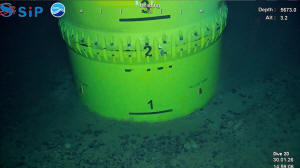Japan retrieves rare earth-rich mud from seabed to lower reliance on
China
[February 03, 2026] By
MARI YAMAGUCHI
TOKYO (AP) — Japan said Monday it has successfully drilled and retrieved
deep-sea sediment containing rare earth minerals from the seabed near a
remote island, as the country seeks to reduce its reliance on China.
The deep-sea drilling vessel Chikyu successfully gathered the sediment
at a depth of nearly 6,000 meters (19,700 feet) near the island of
Minamitorishima, Prime Minister Sanae Takaichi said in a statement on X.
The test retrieval of the rare earths from that depth is a world first,
she added.
“It is a first step toward industrialization of domestically produced
rare earth in Japan,” Takaichi said. “We will make effort toward
achieving resilient supply chains for rare earths and other critical
minerals to avoid overdependence on a particular country."
China controls most of the global production of heavy rare earths, which
are used for making powerful, heat-resistant magnets in industries such
as defense and electric vehicles.
Japan has faced growing tensions with China since Takaichi's comment in
November about a possible Japanese involvement in case of Chinese
military action against Taiwan, the self-governing island that Beijing
claims as its own.
China recently suspended exports to Japan of dual-use goods with
potential military use, raising concern in Japan that rare earths may be
included.
While 17 elements are classified as rare earth, the U.S. government has
identified 50 minerals overall that are labeled critical minerals, which
also include a number of other minerals that are seen as essential to
the economic and military strength of the nation.
Japanese researchers discovered deposits rich with critical minerals
including rare earths around Minamitorishima in the 2010s.

[to top of second column] |

This photo provided by SIP/Japan Agency for Marine-Earth Science and
Technology, shows a mining device inserted into subsea sediment off
Minamitorishima, south of Tokyo, on Jan. 30, 2026. (SIP/Japan Agency
for Marine-Earth Science and Technology via AP)
 Under the Strategic Innovation
Promotion Program, Japan has been working on research, development
and feasibility studies of rare earths deposits around the island.
“The successful retrieval of the sediment containing rare earth
elements is a meaningful achievement from the perspectives of
economic security and comprehensive ocean development,” Japan’s
Deputy Chief Cabinet Secretary Masanao Ozaki said Monday.
He said that moving toward industrialization of rare earths mud
mining will require demonstrating the full process from mining
through separation and refining, as well as verifying its economic
viability, based on the results of the ongoing tests.
Details, including the amount of rare earth contained, still need to
be analyzed, officials said.
The Chikyu, which means Earth, departed last month for
Minamitorishima, about 1,950 kilometers (1,210 miles) southeast of
Tokyo, and arrived at the mining site on Jan. 17. The first batch of
rare earth sediment was retrieved on Feb. 1, according to Japan's
Agency for Marine-Earth Science and Technology, which is conducting
the survey.
Japan’s Self Defense Forces last year said Chinese naval vessels had
been spotted near Minamitorishima.
All contents © copyright 2026 Associated Press. All rights reserved |